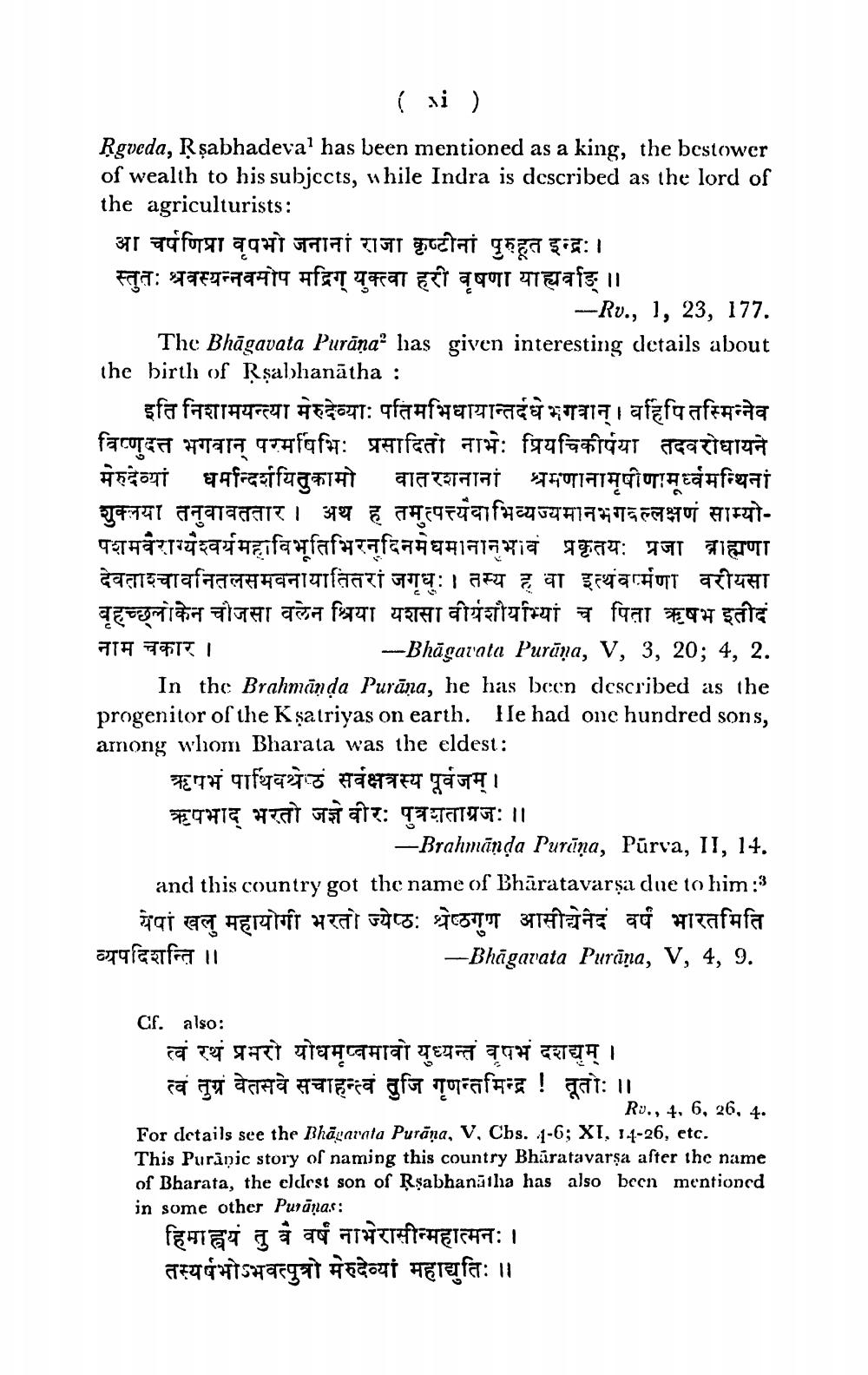________________
( si )
Rgveda, Rṣabhadeva1 has been mentioned as a king, the bestower of wealth to his subjects, while Indra is described as the lord of the agriculturists:
आ चर्षणित्रा वृषभो जनानां राजा कृष्टीनां पुरुहूत इन्द्रः ।
स्तुतः श्रवस्यन्नवमोप मद्रिग् युक्त्वा हरी वृषणा याह्यर्वाङ् ॥
-Rv., 1, 23, 177. The Bhagavata Purāna has given interesting details about the birth of Rṣabhanatha:
इति निशामयन्त्या मेरुदेव्याः पतिमभिधायान्तर्दधे भगवान् । बर्हिपि तस्मिन्नेव विष्णुदत्त भगवान् परमर्षिभिः प्रसादितो नाभेः प्रियचिकीर्षया तदवरोधायने मेरुदेव्यां धर्मान्दर्शयितुकामो वातरशनानां श्रमणानामृषीणामूर्ध्वमन्थिनां शुक्लया तनुवावततार । अथ ह तमुत्पत्त्यैवाभिव्यज्यमानभगवल्लक्षणं साम्योपशमवैराग्यैश्वर्य महाविभूतिभिरनुन्दिनमेघमानानुभावं प्रकृतयः प्रजा ब्राह्मणा देवताश्चावनितलसमवनायातितरां जगृधुः । तस्य ह वा इत्थंवर्मणा वरीयसा बृहच्छ्लोकेन चौजसा वलेन श्रिया यशसा वीर्यशौर्याभ्यां च पिता ऋषभ इतीदं — Bhāgarata Purūna, V, 3, 20; 4, 2. In the Brahmanda Purāna, he has been described as the progenitor of the Ksatriyas on earth. He had one hundred sons, among whom Bharata was the eldest:
नाम चकार ।
ऋषभं पार्थिवश्रेष्ठं सर्वक्षत्रस्य पूर्वजम् । ऋपभाद् भरतो जज्ञे वीरः पुत्रशताग्रजः ।।
— Brahmānda Purūna, Purva, II, 14. and this country got the name of Bharatavarṣa due to him:3 येषां खलु महायोगी भरतो ज्येष्ठः श्रेष्ठगुण आसीद्येनेदं वर्षं भारतमिति -Bhagavata Purana, V, 4, 9.
व्यपदिशन्ति ||
Cf. also:
त्वं रथं प्रमरो योधमुष्वमावो युध्यन्तं वृषभं दशद्युम् । त्वं तुग्रं वेतसवे सचान्त्वं तुजि गृणन्तमिन्द्र ! तूतोः ॥
Ro., 4, 6, 26, 4.
For details see the Bhāgarata Purana, V, Chs. 1-6; XI, 14-26, etc. This Puranic story of naming this country Bharatavarṣa after the name of Bharata, the eldest son of Rṣabhanatha has also been mentioned in some other Puranas:
हिमाह्वयं तु वै वर्षं नाभेरासीन्महात्मनः । तस्यर्षभोऽभवत्पुत्रो मेरुदेव्यां महाद्युतिः ॥




